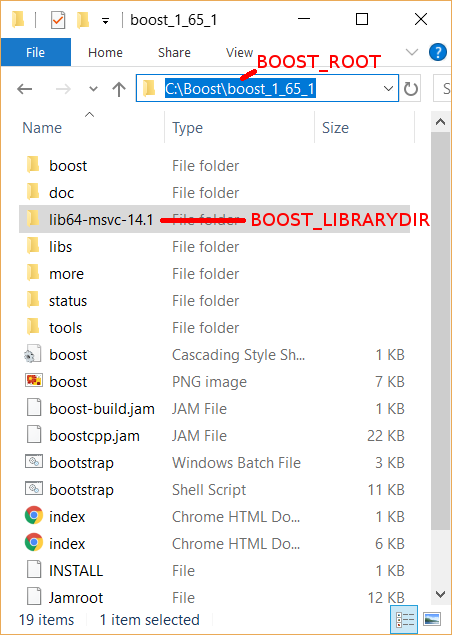Boost
boost is the most important dependency in RobWork, and it is recommended to always use the latest possible version of Boost. RobWork is also backwards compatible with older versions of Boost, mainly to support current Ubuntu LTS releases and CentOS 7. On Windows, you should use at least Boost 1.55, as older releases is not expected to support the Visual Studio versions which are new enough to support C++17.
Boost can either be installed or manually compiled:
Install Boost
Boost precompiled libraries can be found at:
https://sourceforge.net/projects/boost/files/boost-binaries
Choose the newest Boost version that fits your CMake version, according to the table above. Choose the newest precompiled library version, based on your Visual C++ toolset version below:
Boost Version
|
Maximum Visual C++
Toolset (Source)
|
Maximum Visual C++
Toolset (Precompiled)
|
|---|---|---|
1.79.0 |
14.20 (VS 16.0) |
14.3x |
1.78.0 |
14.20 (VS 16.0) |
14.3x |
1.71.0 - 1.77.0 |
14.20 (VS 16.0) |
14.2x |
1.68.0 - 1.70.0 |
14.12 (VS 15.5) |
14.1x |
1.66.0 - 1.67.0 |
14.11 (VS 15.4) |
14.1x |
1.65.1 |
14.11 (VS 15.3) |
14.1x |
1.64.0 - 1.65.0 |
14.10 |
14.1x |
1.63.0 |
14.10 |
14.0 |
1.59.0 - 1.62.0 |
14.00 |
14.0 |
1.57.0 - 1.58.0 |
14.00 |
12.0 |
1.55.0 - 1.56.0 |
12.00 |
12.0 |
In this table, the “Maximum Visual C++ Toolset (Source)” version is the maximum supported version in the Boost source. The newest Visual Studio versions will not be recognized as safe/tested versions by Boost, which means that Boost will issue a lot of warnings while compiling RobWork. Usually, these warnings can simply be ignored, and things will work fine anyway. From Boost 1.67, these warnings are no longer shown for newer Visual Studio toolsets.
As shown in the table, the precompiled libraries for new Visual Studio versions, is built a while after they are introduced in the code. If you want to use Visual Studio 2017, the table shows that you must choose at least Boost 1.64 if you want to use precompiled libraries (or 1.63 if you compile Boost yourself).
The file to download has a name with a format similar to “boost_1_66_0-msvc-14.1-64.exe”. Here 1_66_0 refers to Boost version 1.66.0, msvc-14.1 refers to the Visual C++ toolset version 14.1 (Visual Studio 2017), and 64 means the 64 bit version of Boost.
The Boost installer is straightforward, and we suggest to stick with the default choices during installation. After installation you should have a Boost installation with the following directory layout:

The Boost precompiled installation layout.
Normally, Boost will have a lib folder. For the precompiled installation, this folder has been renamed to lib64-msvc-14.1. This makes it possible to install multiple configurations side by side, for the same Boost version. Note down the path to the Boost folder. Later we will refer to it as BOOST_ROOT. The path to the lib64-msvc-14.1 we will refer to as BOOST_LIBRARYDIR.
Boost installation can be done in 10 minutes and will take up roughly 3.35 GB disk space.
Compile Boost
To compile the Boost libraries from source, get the source and run something similar from a command prompt (only for expert users!):
git clone https://github.com/boostorg/boost
cd boost
git checkout boost-1.74.0
bootstrap.bat
b2 --prefix=C:\Local\boost -j4 --with-filesystem --with-system --with-program_options --with-serialization --with-thread --with-date_time --with-chrono --prefix=.\ address-model=64 link=shared install
Here -j gives the number of threads to use for compilation. –prefix gives the install location, and is set to C:Localboost as this is a standard lookup dir for cmake searching for boost. Run with -help, -help-options or –show-libraries to get more information about the various options.